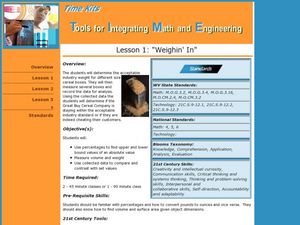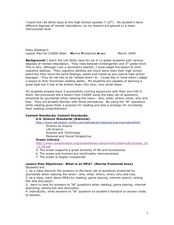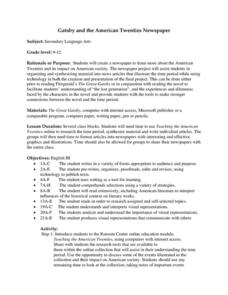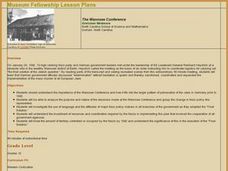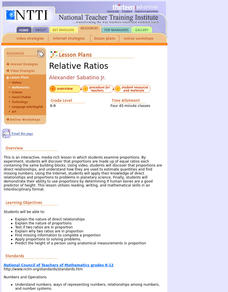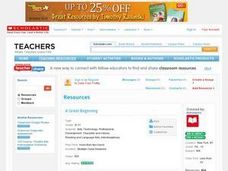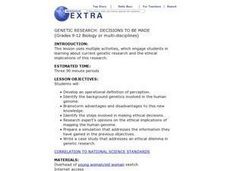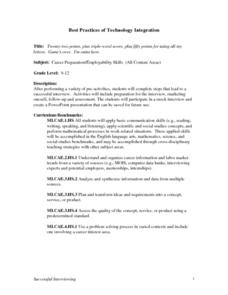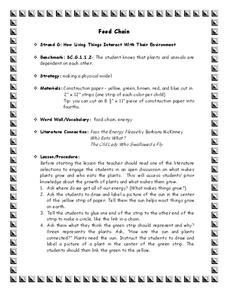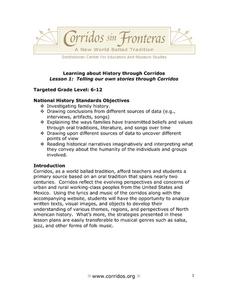Curated OER
What is a Seed?
First graders identify the parts of a seed. In this plant biology lesson, 1st graders are given a seed and identify each part of the seed by using a hand lens. Students plant a seed and graph the growth.
Curated OER
Tools for Integrating Math and Engineering: Weighin' In
Learners collect and analyze data on a fictional cereal company's products. In this measurement lesson, students collect data from cereal boxes (weight, volume, surface area, etc.) to determine if the boxes labels correctly inform...
Curated OER
Marine Protection Areas
Learners explain the importance of having Marine Protected Areas. In this ecology lesson plan, students research MPA's in any of the Great Lakes. They play a MPA simulation game and identify MPA's on the map.
Curated OER
Gatsby and the American Twenties Newspaper
High schoolers research 1920's US History. In this historical literature lesson, students use the novel The Great Gatsby as a tool to examine the era. They work in individually to create newspaper articles based on different historical...
Curated OER
A River, Dead or Alive: Native Americans and European Colonists' Treatment of a River
Students write an expository paragraph about the uses of the Nashua River for the Native Americans and the European Colonists. In this river uses lesson plan, students determine the causes and effects of both parties using the river.
Curated OER
Significant What?
High schoolers define accuracy and precision, and differentiate between the two terms, apply the concepts of accuracy and precision to a given situation and correctly apply the concept of significant figures to measurement and...
Curated OER
Push or Pull
Young scholars discover that one way to change how something is moving is to give it a push or a pull. They design their own boats and work with 'The Great Boat Push' worksheet to compare how their boats move when they are pushed or...
Curated OER
Memories of School Days
Students interview, record, and retell school stories of a family member. They research, document, and describe how schools have changed over time.
Curated OER
Looking at Life through the Creation of Personal Metaphors
Young scholars focus on the creation of personal metaphors, which are first illustrated in pictures and caricatures and then extended to descriptive/analytical paragraphs. They teach the lesson to others using their own personal...
Curated OER
The Wannsee Conference
Twelfth graders examine what occured at the Wannsee Conference during World War II. Using documents, they discover how the conference fits into the final solution of the Jewish question. They analyze the language used and the attitudes...
Curated OER
The Difference Between Acids and Bases Using Different Indicators
Students identify the differences between acids and bases. In this acids and bases lesson plan, students identify and distinguish between acids and bases. They use household products to test the ph levels. They test the ph levels by...
Curated OER
Vivid Verbs
Students explore parts of speech by collaborating in groups. In this verbs lesson, students examine several boring sentences with their class and define verbs which can spice the sentence up. Students collaborate in pairs to enhance...
Curated OER
Relative Ratios
Students discover that proportions are made up of equal ratios each containing the same building blocks. They, using the Internet, apply their knowledge of direct relationships and proportions to problems in planetary science.
Curated OER
Understanding Persuasive Writing
High schoolers give examples of how the media glamorize violence and desensitize viewers to the horrors of real acts of violence. They identify factors in addition to the media that contribute to the problem of violence in society.
Curated OER
Modeling Mitosis and Meiosis
Students construct and manipulate models of mitosis and meiosis and compare/contrast them. They create the models using index cards and yarn, interpret diagrams and photographs, and summarize written descriptions.
Curated OER
A Great Beginning
Young scholars create tri-fold biographical brochures. Each of the sections of the brochure refers to either the past, present or future of the student. They use the back of the brochure to list ways to be successful in high school and...
Curated OER
Genetic Research: Decisions to be Made
High schoolers examine the genetics involved in the human genome. They brainstorm the advantages and disadvantages to this discovery. They research different experts opinion and write a case study which addresses an ethical dilemma.
Curated OER
Successful Interviewing
After performing a variety of pre-activities, students will complete steps that lead to a successful interview. Activities will include preparation for the interview, marketing oneself, follow-up and assessment. The students will...
Curated OER
Silent Symbols Speak Loudly: Icons, Brands & You
Students view and discuss visual symbols around them every day, analyze symbols on United States one dollar bill, explore variety of meanings of same symbols depending on context and culture, and create their own money with symbols that...
Curated OER
Your identity, your heritage
Students list memorable moments fro childhood. They complete the worksheet "Your identity, your heritage." Students look a sites regarding genealogy and discuss information about their families' genealogy or heritage. Students visit the...
Curated OER
Food Chain
Students discuss what makes plants grow and who eats the plants. They are asked where do we get all of our energy? Students are asked to draw and label a picture of the sun in the center of the yellow strip of paper. They are explained...
Curated OER
The Political Dr. Seuss
High schoolers discuss the role political cartoons have played in U.S. politics and public affairs since the 1700's. They analyze some of the political cartoons Dr. Seuss drew during World War II and discuss how these cartoons conveyed...
Curated OER
Parts of Speech- Worksheet 1
In this grammar worksheet, students identify the underlined words in twenty sentences as one of the following parts of speech: noun, verb, adverb, adjective, pronoun, conjunction or preposition.
Curated OER
Passing Down Family History Through Oral Tradition: Corridos
Young scholars create and perform Corridos which are oral tradition ballads. For this Passing Down Family History Through Oral Tradition lesson, students interview family members using a predetermined list of questions. In addition,...



